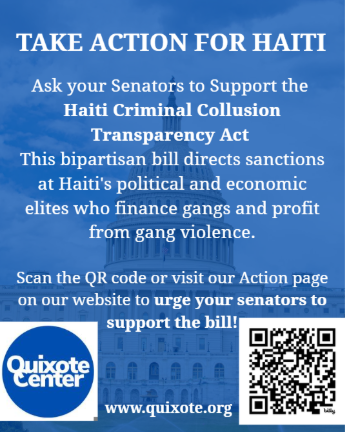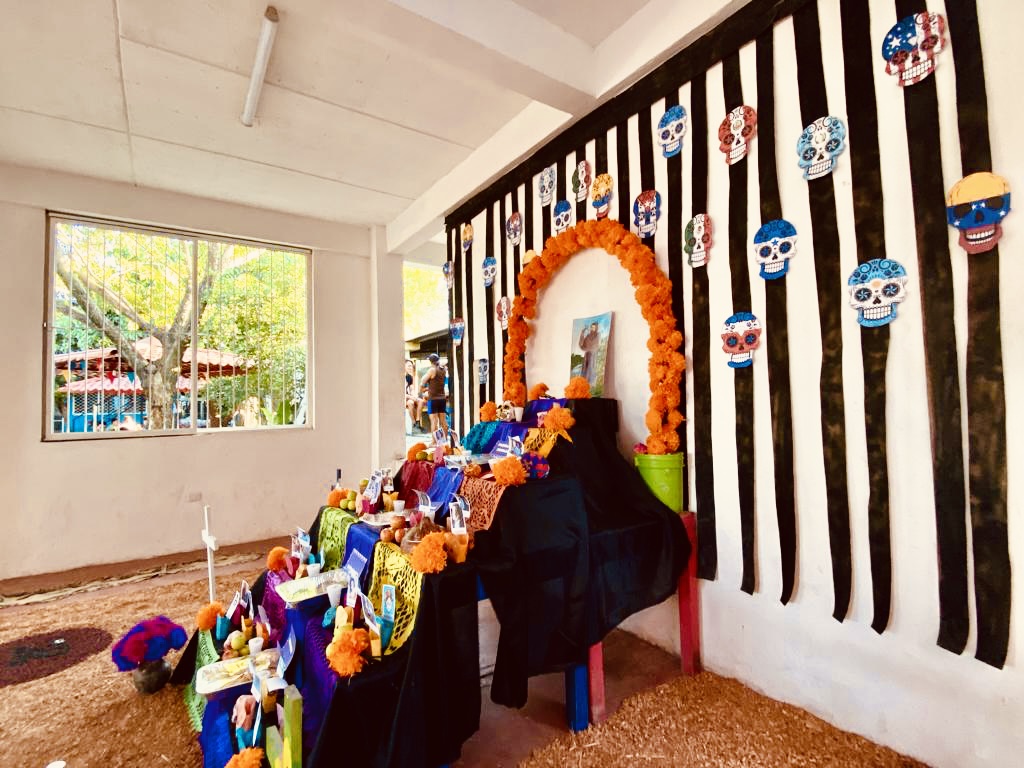Advocacy Update on Haiti, Immigration, USMCA, War Power Resolutions
Quixote Center engages on multiple fronts to impact US policies on interrelated issues that affect the Latin American and Caribbean region.
Haiti Criminal Collusion Transparency Act

Quixote Center engages on multiple fronts to impact US policies on interrelated issues that affect the Latin American and Caribbean region.
Haiti Criminal Collusion Transparency Act

The immigration system in the US is dysfunctional, with decades of failed attempts at comprehensive immigration reform. The reason: powerful interest groups are profiting from it. Although immigrants founded the United States, and our nation is supposed to be a land of opportunity for those seeking the “American Dream”, the US has a complex history of anti-immigrant sentiment with cycles that have pushed and pulled people from all parts of the world.
Haiti’s capital has shut down. With gangs in control, the airport is closed, roads are blocked and the de facto prime minster is stuck in Puerto Rico.
November 1st and 2nd marked Día de muertos in México; however, México is not the only country to celebrate the tradition of honoring the dead this week.

For six months the governors of Texas and Arizona have been bussing migrants to DC, and later to New York, as a political stunt. The effort recently gained nationwide media attention when Governor DeSantis of Florida took credit for flying asylum seekers from Texas to Martha’s Vineyard, without giving any advance notice.
In celebration of Hispanic Heritage Month, we are highlighting leaders from Latin America that have dedicated their lives to promoting peace and justice.
In mid-September of 2021 thousands of migrants began gathering at the Del Rio border crossing in Texas. The majority of the estimated 15,000 people who arrived over the course of a few days were from Haiti. The message from the Biden administration was clear: Don’t come! If you do, you will be sent back.
The United States Coast Guard is intercepting refugees from Haiti and Cuba and returning them back to their home countries in record numbers. As of August 12, 2022, the US Coast Guard had interdicted 6,812 Haitians since the current fiscal year began; over 4,000 Cubans have been intercepted as well.
On August 23rd, our partners at the La 72 migrant shelter commemorated the 12th year anniversary of the San Fernando Massacre. In 2010, 72 migrants were massacred by the Las Zetas cartel in El Huizachal in the municipality of San Fernando, Tamaulipas, Mexico. The San Fernando massacre was one of a series of mass killings that made clear how dangerous the journey through Mexico had become for migrants.
UPDATE: The DC Attorney General's office, whose funding is separate from that of the mayor's office, has announced a grant program of $150,000 to aid nonprofits leading the welcoming response. We welcome this news, but unfortunately this level of funding is still woefully inadequate to meet the needs of mutual aid groups.
Washington DC – The Quixote Center celebrates victories against two Trump-era policies: the defeat of Congressional amendments aimed at extending Title 42, and the effective end of the “Remain in Mexico” program.
Two days before the Quixote Center trip to Mexico, a local journalist called me. Louisiana legislators had just drafted a proposal allowing teachers to bring guns to school, and the press wanted a comment from a local teacher. Just ten days after the Uvalde shooting, leaders hastily crafted legislation to demonstrate their resolve in preventing such tragedies in Louisiana.
“As an educator and a parent, Ms. Molina,” said WDSU's anchorman Sherman Desselle. “What's your response to this proposal?”